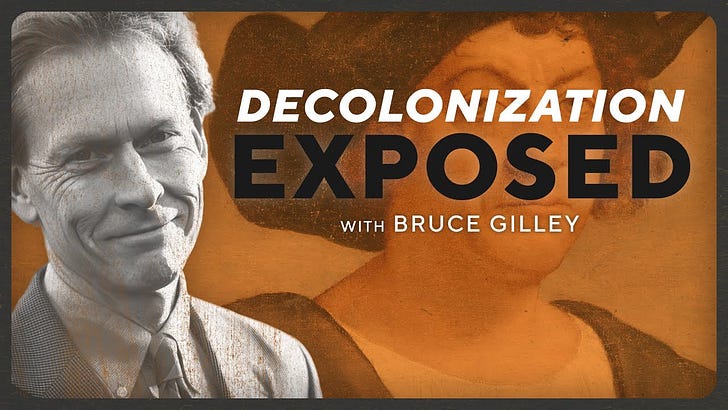In 2021, we launched a series with controversial political science professor Bruce Gilley. The series was about the increasingly relevant topic of decolonization—a topic that continues to enrage people today. Building on his cancelled (literally) 2017 article and book The Case for Colonialism, the series challenges the dominant narrative, offering an unapologetic rethinking of decolonization’s actual impacts.
While many view decolonization as a necessary practical and moral step toward liberation and social progress, Gilley argues the opposite: it is an erosion of civilization. In his view, to decolonize is to reject the foundational values that have shaped modern Western civilization—freedom, democracy, creativity, merit, science, and the pursuit of a liberal society.
Gilley is not arguing mere academic theory; he is making a call to confront uncomfortable truths about the consequences of dismantling colonial legacies. Gilley forces us to ask: If decolonization means the rejection of the principles that have led to prosperity and democratic freedom, can we claim it as a force for good? This rethinking compels us to question whether the ideals of decolonization align with the future we want to build, or whether they are leading us down a dangerous path of decline. The series doesn’t offer easy answers—but it does challenge us to reconsider whether decolonization is an intrinsic good.
Here is that series in long format. Is decolonization reshaping our world?



I have read Dr Gilley's book and wish that school teachers would have in their arsenal. Sadly, they don't. I am a mum of a fourteen year old boy who knows very little about the great things colonisation has done for our country and what it is today. They are being taught how terrible we are and have been to our indigenous Australians. They have them and the younger children as it's a K-12 school writing sorry letters and saying a welcome to country at every school gathering. There is no Easter hat parade for the children in kindergarten or the singing of the national anthem. Eurocentric ideas are being discontinued and discredited because they are too "white". They are teaching about the atrocities of industrialisation but not the benefits and how we are living today because of what we have experienced in the last 250 years or so.
We live in bizarre times. They want our children to know nothing of the past or a fabricated version to be advocates leading to activism for the "protected minorities" of the 21st century. For this year we have decided to homeschool our son. I don't agree with decolonisation. Colonialism has made us who we are today. The good and the bad of how we arrived here.
I think these are great resources for young children who want to know about why they know very little about history of western civilisation.
Wow! I am continually amazed that so many thoughts that occurred to me over the recent years are now coming to be expressed in a more coherent form by public commentators. We are currently in the middle of a culture war whose base ideology is "anti-Westernism". It is a deliberate denigration of Western culture, history and even revanchism against European ethnicity.
Whatever you call it (Cultural Marxism?) it is a combination of Marxism and post-modern academic ideology, proselytised by a generation of post '68 academics.
The people who resent the West actually want the benefits it has brought, but want to denigrate the culture that brought them. Not ironically because they don't possess the cultural competence to create these values themselves.